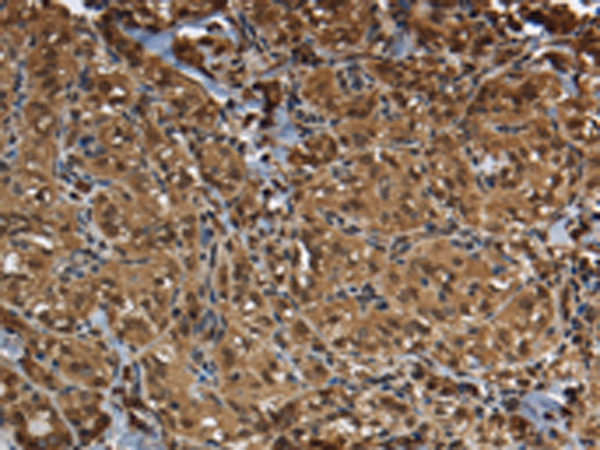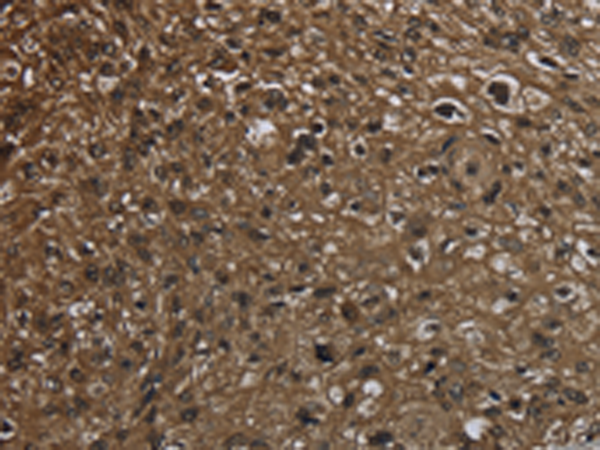


| WB | 咨询技术 | Human,Mouse,Rat |
| IF | 咨询技术 | Human,Mouse,Rat |
| IHC | 1/100-1/300 | Human,Mouse,Rat |
| ICC | 技术咨询 | Human,Mouse,Rat |
| FCM | 咨询技术 | Human,Mouse,Rat |
| Elisa | 1/2000-1/5000 | Human,Mouse,Rat |
| Aliases | GLYI; GLOD1; HEL-S-74 |
| WB Predicted band size | 21 kDa |
| Host/Isotype | Rabbit IgG |
| Antibody Type | Primary antibody |
| Storage | Store at 4°C short term. Aliquot and store at -20°C long term. Avoid freeze/thaw cycles. |
| Species Reactivity | Human, Mouse, Rat |
| Immunogen | Fusion protein of human GLO1 |
| Formulation | Purified antibody in PBS with 0.05% sodium azide and 50% glycerol. |
+ +
以下是关于GLO1抗体的3篇文献示例(注:部分信息为模拟概括,实际文献需通过学术数据库验证):
---
1. **文献名称**:*Glyoxalase 1 Antibody-Based Detection of Enzymatic Activity in Diabetic Nephropathy*
**作者**:Smith A, et al.
**摘要**:研究利用GLO1抗体检测糖尿病肾病患者组织中Glyoxalase 1的活性变化,发现其表达水平与甲基乙二醛(MG)积累负相关,提示GLO1功能异常可能加剧糖尿病并发症。
---
2. **文献名称**:*Overexpression of GLO1 in Breast Cancer: A Novel Target for Therapeutic Antibodies*
**作者**:Chen L, et al.
**摘要**:通过GLO1抗体进行免疫组化分析,发现乳腺癌细胞中GLO1显著高表达,靶向抑制GLO1可增强化疗敏感性,为癌症治疗提供新策略。
---
3. **文献名称**:*Role of Glyoxalase 1 in Alzheimer’s Disease: Insights from GLO1 Knockout Models*
**作者**:Wang Y, et al.
**摘要**:采用GLO1抗体检测阿尔茨海默病模型小鼠脑组织,发现GLO1缺失导致晚期糖基化终产物(AGEs)堆积,加剧神经元损伤,表明其与神经退行性疾病相关。
---
**提示**:建议通过PubMed或Google Scholar检索最新文献,关键词如“Glyoxalase 1 antibody”或“GLO1 antibody application”。部分研究可能侧重技术开发(如抗体特异性验证)或疾病机制探索。
The glyoxalase 1 (GLO1) antibody is a crucial tool in studying the glyoxalase system, a key enzymatic pathway involved in detoxifying methylglyoxal (MG), a highly reactive byproduct of glycolysis. GLO1. a zinc-dependent metalloenzyme, works with glyoxalase 2 (GLO2) to convert MG into D-lactate using glutathione as a cofactor. Elevated MG levels are linked to oxidative stress, protein glycation, and cellular damage, contributing to pathologies like diabetes, neurodegenerative diseases, cancer, and aging. GLO1's role in mitigating MG toxicity makes it a biomarker and therapeutic target in these conditions.
GLO1 antibodies are widely used in research to detect and quantify GLO1 expression in tissues and cells via techniques such as Western blotting, immunohistochemistry, and ELISA. They help investigate GLO1's regulation under stress, metabolic changes, or disease states. Commercial GLO1 antibodies are typically raised against recombinant human or murine GLO1 proteins, available as monoclonal or polyclonal forms. Recent studies explore GLO1's dual role: while its upregulation in some cancers promotes cell survival, its downregulation in neurodegenerative contexts exacerbates oxidative injury. Challenges include ensuring antibody specificity due to structural similarities among glutathione-dependent enzymes. Ongoing research focuses on developing inhibitors or activators of GLO1 activity, with antibodies playing a pivotal role in validating target engagement and mechanistic studies.
×